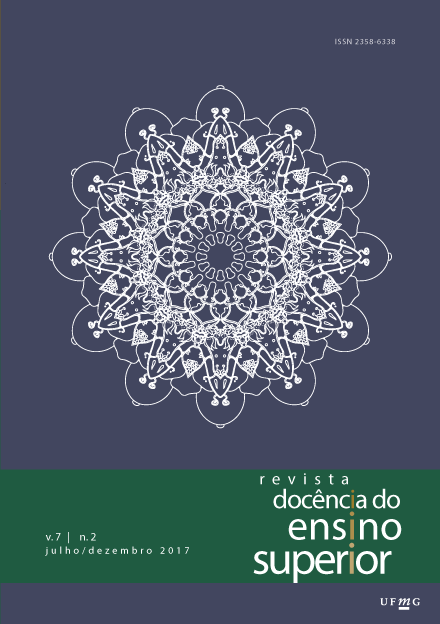Proposta pedagógica para a avaliação por pares em atividades de execução musical
primeiras ações
DOI:
https://doi.org/10.35699/2237-5864.2017.2268Palavras-chave:
Avaliação por pares, Design-based research, Avaliação da execução musicalResumo
Este artigo apresenta os primeiros passos de um estudo realizado por dois grupos de pesquisa, um na área de música e outro na área de educação. Trata-se de um projeto de longa duração com desdobramentos e diversos outros projetos de pesquisa subsidiários. O objetivo desse projeto maior é, por meio da abordagem chamada Design-Based Research (DBR), descobrir quais são as características de um sistema de avaliação por pares, para gerar aprendizagem dos estudantes e satisfação dos docentes em disciplinas de execução musical em cursos de graduação em música. O projeto aborda uma fundamentação teórica, aplicação e funcionamento geral da DBR, apresenta o objeto de estudo geral que é avaliação em cursos superiores de música e posteriormente a avaliação por pares. A partir daí o artigo traz a dinâmica de trabalhos realizada e os diversos subprojetos que estão sendo desenvolvidos e previstos para as primeiras fases da DBR.
Downloads
Referências
BOUD, D. & Associates. Assessment 2020: seven propositions for assessment reform in higher education. Sydney, Australia: Australian Learning and Teaching Council, 2010.
COHEN, Louis; MANION, Lawrence; MORRISON, Keith. Research methods in education. London: Routledge, 2007. 638 p.
DESIGN-BASED RESEARCH COLLECTIVE. Design-Based Research: an emerging paradigm for educational inquiry. In: Educational Researcher, Washington, v. 32, n. 1, p. 5-8, 2003.
DIEHL, Astor; TATIM, Denise Carvalho. Pesquisa em ciências sociais aplicadas: métodos e técnicas. São Paulo: Prentice Hall, 2004.
HALLAM, Susan. Music psychology in education. London: Bedford Way Papers (Institute of Education, University of London), 2006. 281 p.
HUNTER, D.; RUSS, M. Peer assessment in performance studies. In: British Journal of Music Education, Cambridge, v. 13, n. 1, p. 67-78. 1996.
MASCARENHAS, Sidinei Augusto. Metodologia científica. São Paulo: Pearson Education do Brasil, 2012. 126 p.
MATTA, Alfredo Eurico Rodrigues; SILVA, Francisca de Paula Santos da Silva; BOAVENTURA, Edvaldo Machado. Design-Based Research ou pesquisa de desenvolvimento: metodologia para pesquisa aplicada de inovação em educação do século XXI. In: Revista da FAEEBA – Educação e Contemporaneidade, Salvador, v. 23, n. 42, p. 23-36, jul./dez. 2014.
MCKENNEY, Susan. Computer-based support for science education materials developers in Africa: exploring potentials. Doctoral dissertation. Enschede: University of Twente, 2001. 281 p.
MCNEILL, Patrick; CHAPMAN, Steve. Reserarch methods. London: Routledge, 2005. 214 p.
MCPHERSON, Gary E.; THOMPSON, William F. Assessing music performance: issues and incluences. Research Studies in Music Education, Sydney, n. 10, p. 12-24. jun. 1998.
PLOMP, Tjeerd; NIEVEEN, Nienke (ed.). An introduction to educational design research. Uitgever: SLO, Enschede, 2009. 126 p.
SEARBY, Mike; EWERS, Tim. An evaluation of the use of peer assessment in higher education: a case study in the School of Music, Kingston University. Assessment & Evaluation in Higher Education, v. 22, n. 4, p. 371-383, 1997.
SHAVELSON, R.; TOWNE, L. Scientific research in education. Washington DC: National Academic Press, 2002. 188 p.
TOPPING, Keith. Peer assessment between students in colleges and universities. Review of educational research, v. 68, n. 3, p. 249-276, Fall, 1998.
VALLE, Christopher; ANDRADE, Heidi; PALMA, Maria; HEFFEREN, Joanna. Applications of peer assessment and self-assessment in music. Music Educators Journal, v. 102, n. 4, p. 41-49, jun. 2016.
VAN DEN AKKER, J.; GRAVEMEIJER, K; MCKENNEY, S.; NIEVEEN, N. (ed.). Educational design research. London: Routledge, 2006. 163 p.
ZHUKOV, Katie. Challenging approaches to assessment of instrumental learning. In: LEBLER, Don; CAREY, Gemma; HARRISON, Scott D. (ed.). Assessment in music education: from policy to practice. Springer/Cham/Heidelberg/New York/Dordrecht/London: Springer International Publishing Switzerland, 2015. p. 55-70.
Downloads
Publicado
Edição
Seção
Licença
Autores que publicam nesta revista mantêm os direitos autorais e concedem à revista o direito de primeira publicação, com o trabalho simultaneamente licenciado sob a Licença Creative Commons Attribution que permite o compartilhamento do trabalho com reconhecimento da autoria e publicação inicial nesta revista.
Autores têm autorização para assumir contratos adicionais separadamente, para distribuição não-exclusiva da versão do trabalho publicada nesta revista (ex.: publicar em repositório institucional ou como capítulo de livro), com reconhecimento de autoria e publicação inicial nesta revista.
Política de acesso aberto:
A Revista Docência do Ensino Superior é um periódico de Acesso Aberto, o que significa que todo o conteúdo está disponível gratuitamente, sem custo para o usuário ou sua instituição. Os usuários podem ler, baixar, copiar, distribuir, imprimir, pesquisar ou vincular os textos completos dos artigos, ou usá-los para qualquer outra finalidade legal, sem solicitar permissão prévia do editor ou do autor, desde que respeitem a licença de uso do Creative Commons utilizada pelo periódico. Esta definição de acesso aberto está de acordo com a Iniciativa de Acesso Aberto de Budapeste (BOAI).



























